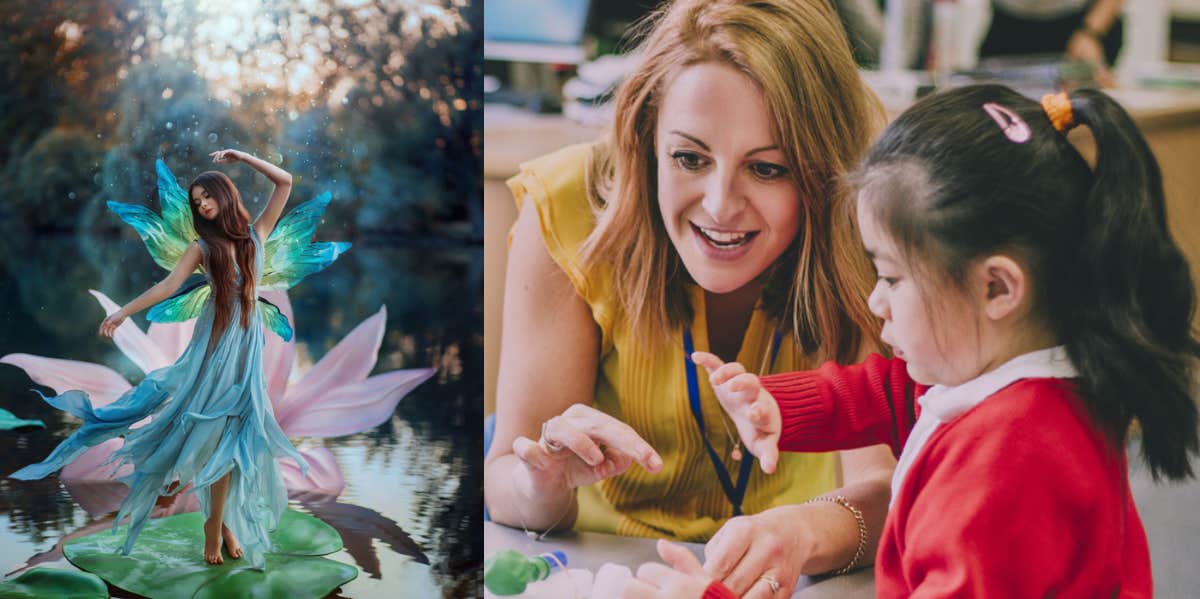Parent Overhears Kindergarten Teacher Telling Students She Sees Fairies & 'Forces' The Kids To Say They See Them Too
While it is important to have an imagination, was this teacher taking things too far?
 DGLimages / Ironika / Shutterstock
DGLimages / Ironika / Shutterstock It is common for children to have imaginary friends that tag along with them wherever they go. However, it is rather unusual for adults to have them. One mother is concerned after noticing that her child’s kindergarten teacher appeared to see imaginary fairies, and insisted that her students see them too.
Sharing the bizarre story to the subreddit, r/Parenting, the mother admits that she is considering pulling her children from their school after witnessing the interaction between her child’s kindergarten teacher and students.
The teacher claimed that she saw fairies flying through the air, and demanded the students say they saw them too.
As the class was taking a walk along a stream, the teacher asked her students what they saw around them. “Kids were naming real things which one might expect to see there,” the woman wrote. Although the students were noting the things they were seeing to their teacher, she claimed that their observations were incorrect.
“She was like no... No..... No... to each kid, when they ran out of ideas what she wants from them,” the mother shared. That’s when the teacher declared that she had spotted something unusual. “She blissfully announced that they saw fairies.”
Initially, the mother assumed that the children had decorated the area surrounding the stream where they were walking with artificial fairies as part of a class assignment. However, as she watched the students’ reactions, it appeared that was not the case.
“The kids were completely frozen, not single kid was like ‘oh yeah right, that's true,’” the concerned woman wrote. “Then she asked them repeatedly if they saw them too and kids were really awkwardly, with a little bit of fear and self-doubt, answering tiny yeses.”
The interaction was enough to make the mother consider pulling her children from school.
Other Redditors agreed that the teacher’s insistence on seeing fairies was strange, and offered the mother suggestions as to how she should handle the situation.
Many encouraged her to address with the teacher that while there is nothing wrong with having an active imagination, it is important for children to distinguish between what is real and what is make-believe.
“Probably just discuss this with her. ‘My kids need to understand when you're playing make-believe. Wednesday when you told the kids there were fairies they seemed really confused,’” one user recommended. “If she tries to convince you there were fairies, it might be time to go…People lie all the time about holiday creatures. Part of growing up is learning to recognize not everything everyone says feels like the truth. This was probably inadvertently a good lesson for them.”
“That’s so weird and inappropriate. First denying legitimate responses and then insisting on something imaginary. The kids were then made to say yes in order to satisfy their authority figure,” another user wrote.
However, other users believed that the teacher’s actions were harmless and that she was likely trying to encourage her students to be creative and imaginative.
“ Was the teacher just trying to make some imaginative fun for the kids, and it didn't land? This doesn't sound super serious to me,” one user commented.
“As a teacher, I have to advocate for the devil. Are the fairies connected to some learning? Like did they plant little fairies on the path and the kids didn’t notice?” another user added.
It's important for children to have an active imagination.
However, they should also recognize what is real and what is fantasy since it develops essential life skills. While children’s minds are limitless and encouraging them to have imagination allows them to develop creativity, problem-solving, and life skills, it is also important for them to recognize what is real life and what is make-believe.
 Photo: Sunny studio / Shutterstock
Photo: Sunny studio / Shutterstock
Recognizing the distinction between make-believe and reality lays the groundwork for various educational concepts. Children can grasp the concept of facts, and understand history, science, and other subjects based on evidence and truth. They can also discern reliable sources of information, contributing to their overall intellectual growth.
If the teacher was providing her students a lesson about imaginary fairies, it would be wise of her to continue the conversation by recognizing that the fairies were not actually there, and certainly not forcing them to see exactly what she sees.
Everyone’s imagination is different after all.
Megan Quinn is a writer at YourTango who covers entertainment and news, self, love, and relationships.

